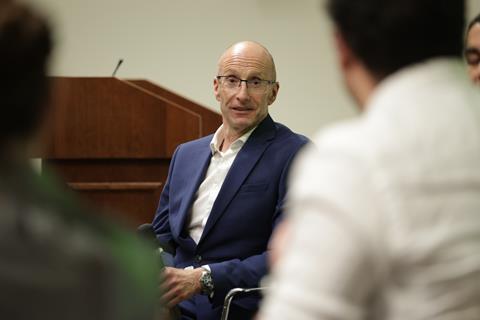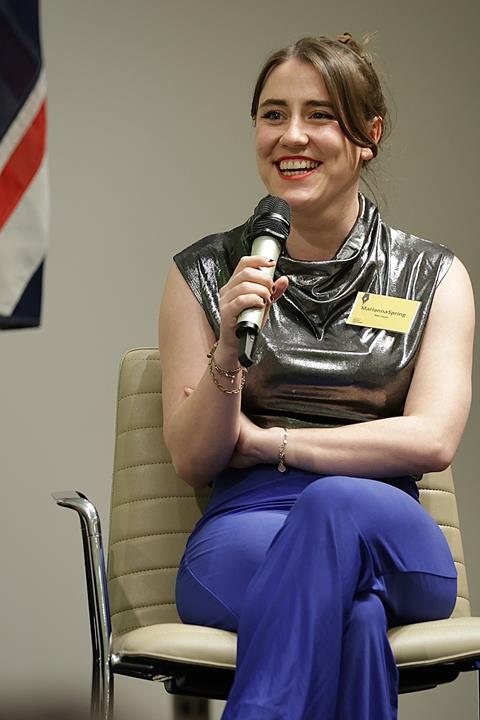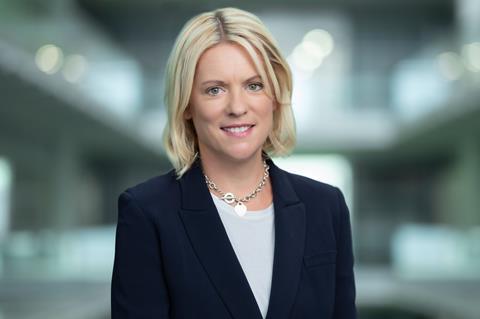The Rory Peck Trust (RPT) and the US Embassy teamed up to celebrate World Press Freedom Day 2024, for a mixed audience of experienced news journalists and 50+ students studying Journalism at seven colleges including UCL, Goldsmiths, Kings College and Oxford Brookes. The event included a session on AI’s influence on journalism, and several masterclasses, George Jarrett reports.
Jon Williams, the new executive director of RPT, spoke exclusively to IBC365 after chairing a session on AI. Asked what he identifies as the biggest challenges to a freelance community robbed of the previously vital status of neutrality, Williams said: “There are two things – the industry environment and the global environment, both of which are fracturing.

“Increasingly news organisations are reducing staff, and some are reducing international coverage and have become more reliant than ever before on freelancers to get the news,” he added. “In terms of the global situation, increasingly around the world there are places where international reporters just cannot go. Whether that is Myanmar, China, or Gaza, luckily the local journalists are already there.”
“We need to explain the role that the Trust plays in protecting media freedom. By supporting the journalists on the front line, we are supporting the media freedom of the customers for that journalism,” Jon Williams, Executive Director, Rory Peck Trust
The event was opened by Mathew Palmer, Deputy Chief of Commission at the US Embassy, who said: “I applaud journalistic tenacity and dedication to the truth, because democracies like the US and UK rely on a free and open press.”
Tira Shubart, chair of the RPT, added: “The critical investigative journalists that we need so badly are for addressing the environmental, climate issues. They are absolutely essential if we want to progress. But those journalists that already cover climate stories are facing physical violence and legal harassment.”
Eliminating the Risk
With global circumstances as they are, and local journalists taking on critical coverage, weighing the risks against opportunities is now a daily task. Are the foreign news organisations going to transition the level of safety support they have historically given staff to the freelancers too?
“The challenge for the RPT is greater than ever in terms of meeting the freelancer needs and supporting journalists around the world,” said Williams.
The event was a “moment to celebrate what journalism is to public life,” but Williams felt it was also a time to pause and reflect by remembering those journalists lost along the years, most notably Rory Peck himself.
“It is unlikely that foreign news agencies will transition to using paramedics, but that is why we fund bursaries for freelancers to learn safety practices and first aid. But you can never eliminate the risk and if your time is up, it is up. What we can do is give people the skills to survive,” he added.
The event was a “moment to celebrate what journalism is to public life,” but Williams felt it was also a time to pause and reflect by remembering those journalists lost along the years, most notably Rory Peck himself.
“Twenty years ago, on 6 June, a colleague of mine called Simon Cumbers was shot dead in a terrorist attack in Riyadh. He was on assignment for the BBC (with security correspondent Frank Gardner who was also shot and paralysed but survived). There is not a day that I don’t think about Simon,” he said.
“He shared the same buccaneering and pioneering spirit that Rory had, always running towards the story when others were running away. We want to make a difference because there have been too many Simons and Rory’s, and danger does not discriminate,” he added.
Removing the Mental Health Stigma
Back in the 1970’s, news people with PTSD were thought to have had ‘Too much Bang-Bang’, so how much of this is a continuing problem?
“People are more self-aware, but there are more conflicts underway around the world today than there has ever been since the end of WW2. There is a lot of ‘Bang-Bang’ around,” said Williams.
“I was the BBC’s foreign editor for seven years, and I was very open about my own family’s issues with mental health because I wanted people to be open about their own issues. It triggered a wave of people who had feared that being open about their mental health would damage their careers to come forward,” he added. “And when they saw that one of their colleagues was promoted after coming forward and talking about his own issues, it built the confidence for more people to be honest about it.”
Supporting Media Freedom
Williams believes that the industry can create a culture where people speak about mental health to both peers and outsiders. He added: “As an industry we are in a much better place now than we were 20-30 years ago.”

He then talked of the elements of his long experience in TV news journalism he will bring to the ‘near news’ role with the RPT:
“I have grown up with many of the people who are now running the business, and I have had 35 years of trying to make content for particular audiences. The Trust needs to continue its focus in terms of the programs and operations it provides, but we need to tell our story slightly differently. We need to explain the role that the Trust plays in protecting media freedom. By supporting the journalists on the front line, we are supporting the media freedom of the customers for that journalism,” he said.
Williams has been on the board of the Committee to Protect Journalists for seven years, and he chairs the CPJ’s assistance committee, on connections and advocacy he said:
“By trying, not to bring together, but by taking a more holistic approach to it - with all of the industry organisations doing fantastic work for journalists - is something I hope I am in a reasonable place to achieve,” he said.
“The tragedy is that three decades on the RPT’s support is needed so incredibly widely. We are already helping some of the freelance news gatherers from Gaza who made it to safety elsewhere, and to mark the RPT’s 30th anniversary (in 2025) we want to create an endowment, a funded fellowship to lift one journalist a year out of a conflict zone and bring them to the UK to continue and develop their journalism,” he added.
AI’s Influence on Global Politics
Speakers then assembled to discuss AI: Rachel Corp, CEO of ITN, Marianna Spring, Disinformation Correspondent, BBC News, Murad Ahmed, FT’s Technical News Editor, Tom Clarke, Science Editor, Sky News, and Daniel Zuidjik, Misinformation Correspondent, Bloomberg.
Spring had been involved in a Panorama look at the US election. She commented: “We found lots of AI generated images of both Biden and Trump, and lots of them were satirical. There was one image that showed Trump with a group of voters that was quite convincing when you first looked, but when looking closely people had eyes on their cheeks and an extra finger.
“This had been generated and shared by a conservative radio host in Florida, and when I said to him the image is not real… he perceived it was just fair play as an election tactic,” she added, commenting on the misguided support and perceptions these incidents can generate.
“The thing I am most alive to, is AI generated audio. One of the cases I investigated recently that did have a real-world impact in terms of AI generated content was the fake clip of Sadiq Khan,” she added.
A Precious Balance
Rachel Corp shared her concerns: “That explosion of AI a couple of years ago has brought it right up there in the list of priorities. We are all grappling with some of the signs and some of the implications, so there is quite a lot going on at different levels. Certainly, among the broadcasters there is quite a lot of sharing of what we are learning, and whilst everyone has to work out their own internal codes, we are all benefitting from talking to each other.”

Corp talked about ITN writing to the Government last year to raise the issue of AI and the upcoming election: “At least the conversation has been had with Government, and with media more widely, meaning broadcast as well as print. There is that feeling that we have done something very precious in this country with our journalism, particularly with our regulators of broadcast journalism.”
To PSB companies it is all about audience being able to find the real content. “There is a lot being talked about generally about how people can find that trusted content in a world where there might be a lot more misinformation,” said Corp. “We talk a lot about deep fakes, but we should worry about shallow fakes as well.”
ITN can only think of focussing on eye witness journalism, and it is some of that ‘drudge work’ that can be done with AI, be it transcription, logging interviews or crunching a lot of data.
“We at ITN have the fortune that we do our journalism. We also work in other areas so we are able to experiment a little bit more safely. If there is a way that we can make content reach more people more easily, that has to be a positive, so we are looking at that in our education department,” said Corp. “And if you can do different language versions, we have looked at that through sport; so there is a lot of experiments going on, and we just need to find that balance.”
























No comments yet